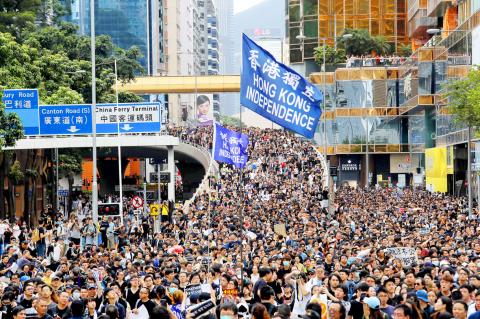Tens of thousands of anti-government protesters yesterday rallied outside a train station linking Hong Kong to China, the latest mass show of anger as advocates try to keep pressure on the territory’s pro-Beijing leaders.
The rally was the first major large-scale protest since Monday last week’s unprecedented storming of the Hong Kong Legislative Council by largely young, masked protesters — which plunged the territrory further into crisis.
Hong Kong has been rocked by a month of huge marches as well as a series of separate violent confrontations with police, sparked by a bill that would allow extraditions to China.

Photo: AP
The bill has since been postponed in response to the intense backlash, but that has done little to quell public anger, which has evolved into a wider movement calling for democratic reforms and a halt to sliding freedoms in the semi-autonomous territory.
Organizers said about 230,000 people snaked their way through streets in the harbor-front district of Tsim Sha Tsui, an area popular with Chinese tourists.
Police said 56,000 turned out at the protest’s peak.
The march was billed as an opportunity to explain to Chinese in the territory what their protest movement is about.
Inside China, where news and information are heavily censored, the Hong Kong protests have been portrayed as a primarily violent, foreign-funded plot to destabilize the motherland, not a mass popular movement over Beijing’s increased shadow over the semi-autonomous territory.
“We want to show tourists, including mainland China tourists, what is happening in Hong Kong and we hope they can take this concept back to China,” Eddison Ng, an 18-year-old demonstrator, told reporters.
Hong Kongers speak Cantonese, but protesters were using Bluetooth to send leaflets in Mandarin — the predominant language in China — to nearby smartphones, hoping to spread the word by digital word of mouth.
“Why are there still so many people coming out to protest now?” one man said in Mandarin through a loudspeaker. “Because the Hong Kong government didn’t listen to our demands.”
Many protest banners were written with the simplified Chinese characters used in China, not the traditional characters used in Taiwan and Hong Kong.
A Hong Kong lawmaker coached crowds how to chant “Students are not rioters” using standard Mandarin pronunciation.
Protesters were demanding that the postponed extradition bill be scrapped entirely, an independent inquiry into police use of tear gas and rubber bullets, amnesty for those arrested, and for the unelected Hong Kong Chief Executive Carrie Lam (林鄭月娥) to step down.
In an interview with the BBC yesterday, Chinese Ambassador to the UK Liu Xiaoming (劉曉明) said the extradition bill was needed to “plug loopholes” and that Beijing has “full confidence in the Hong Kong government.”
The protest began on the waterfront — the first time a rally has taken place off Hong Kong’s main island — and made its way to West Kowloon, a multibillion-dollar station that links to China’s high-speed rail network.
Police placed the glass-and-steel structure in virtual lockdown. Long lines of water-filled security barriers surrounded the station, while only those with previously purchased tickets were being allowed in.

The CIA has a message for Chinese government officials worried about their place in Chinese President Xi Jinping’s (習近平) government: Come work with us. The agency released two Mandarin-language videos on social media on Thursday inviting disgruntled officials to contact the CIA. The recruitment videos posted on YouTube and X racked up more than 5 million views combined in their first day. The outreach comes as CIA Director John Ratcliffe has vowed to boost the agency’s use of intelligence from human sources and its focus on China, which has recently targeted US officials with its own espionage operations. The videos are “aimed at

STEADFAST FRIEND: The bills encourage increased Taiwan-US engagement and address China’s distortion of UN Resolution 2758 to isolate Taiwan internationally The Presidential Office yesterday thanked the US House of Representatives for unanimously passing two Taiwan-related bills highlighting its solid support for Taiwan’s democracy and global participation, and for deepening bilateral relations. One of the bills, the Taiwan Assurance Implementation Act, requires the US Department of State to periodically review its guidelines for engagement with Taiwan, and report to the US Congress on the guidelines and plans to lift self-imposed limitations on US-Taiwan engagement. The other bill is the Taiwan International Solidarity Act, which clarifies that UN Resolution 2758 does not address the issue of the representation of Taiwan or its people in

US Indo-Pacific Commander Admiral Samuel Paparo on Friday expressed concern over the rate at which China is diversifying its military exercises, the Financial Times (FT) reported on Saturday. “The rates of change on the depth and breadth of their exercises is the one non-linear effect that I’ve seen in the last year that wakes me up at night or keeps me up at night,” Paparo was quoted by FT as saying while attending the annual Sedona Forum at the McCain Institute in Arizona. Paparo also expressed concern over the speed with which China was expanding its military. While the US

SHIFT: Taiwan’s better-than-expected first-quarter GDP and signs of weakness in the US have driven global capital back to emerging markets, the central bank head said The central bank yesterday blamed market speculation for the steep rise in the local currency, and urged exporters and financial institutions to stay calm and stop panic sell-offs to avoid hurting their own profitability. The nation’s top monetary policymaker said that it would step in, if necessary, to maintain order and stability in the foreign exchange market. The remarks came as the NT dollar yesterday closed up NT$0.919 to NT$30.145 against the US dollar in Taipei trading, after rising as high as NT$29.59 in intraday trading. The local currency has surged 5.85 percent against the greenback over the past two sessions, central